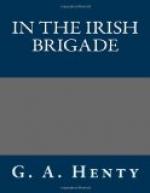“At any rate, I will take your advice, O’Sullivan, and will keep my lips sealed, as to Father O’Leary’s views. As you see, by my presence here, he has not convinced me, and as long as there is a hope that, by the aid of a French army, we may yet see our king come to his own again, I shall do my best to prove myself a faithful soldier of France. I have chosen my career with my eyes open. A loyal Irishman cannot obtain employment, still less military employment, in his own country, and accordingly, we are to be found fighting as soldiers of fortune in every country in Europe. At least there is some chance that we may be benefiting the royal cause by fighting for the country that gave King James shelter, and rendered him armed assistance in his struggle with the usurper, and will probably give aid, more or less efficient, when the next attempt is made. In other countries we are but soldiers of fortune. In France we may regard ourselves as serving our own king by serving King Louis.”
“Do you speak French well, Kennedy?” O’Neil said, changing the conversation abruptly.
“Yes. Father O’Leary took care of that, for I always said that I should take service abroad, as there was clearly nothing else to do for a living, and, consequently, he generally talked to me in that language, and I speak it as well as I do English or Irish.”
“You have not had much practice with the sword, I suppose?”
“Not so much as I could wish, though I never lost an opportunity of practising. There were several of the tenants who served in the regiment James O’Carroll raised. I used to practise with them, but I shall lose no time in getting the best instruction I can, here.”
“You may want it, Kennedy. We are not particularly liked by the French officers, because we are generally chosen to lead an assault, or for other desperate service. Duelling is, of course, forbidden, but that in no way prevents duels from being frequent. As for fighting in action, as far as I have seen or heard, swordsmanship does not go for a great deal. If you press on hard enough, and there are men following you, the enemy give way, generally, before it comes to hand-to-hand fighting. If, on the other hand, they are the more numerous, and hold their position in the breach, it is the musketry that settles it. It is only when two officers happen to meet, in a fierce fight, that swordsmanship becomes of importance.
“We have a good school in the regiment, and there are several famous masters of fence in the town, so I should advise you to give a couple of hours a day, for a time, to making yourself a first-rate swordsman. I have just left off. Our maitre d’armes tells me I am too hotheaded ever to make a fine blade; but I should fancy, from the way you have been arguing, that you are likely to be cooler than most of us in a fencing bout. It is the fault with us all that we are apt to lose our tempers, and indeed Maitre Maupert, who is the best teacher here, declines absolutely to take any of us as pupils, saying that, while we may do excellently well in battle, he can never hope to make first-class fencers of men who cannot be relied upon to keep their heads cool, and to fight with pointed weapons as calmly as they might fence with a friend in a saloon.”




